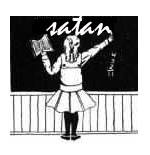
Is There Such a Thing as Catholic Ghost Stories?
AN ABERRATION ? AN OXYMORON ?
It might seem, at first glance, that ghost stories — like the closely related genres of horror, weird, and supernatural fiction — are unlikely candidates for inclusion in the pantheon of Catholic literature. The objection is sometimes raised that the Bible contains strong prohibitions against sorcery, divination, and necromancy. The fate of King Saul after consulting the Witch of Endor (1 Sam.) provides a chilling example of the dangers of meddling in forbidden realms. And certainly, an unhealthy attraction to the occult and its practices is to be avoided.
One could say the same of much of the fiction currently on the market. To even the casual observer, it’s obvious that bookstore shelves and electronic media overflow with all kinds of rubbish filled with violence, gore, sexual deviance, profanity, and twisted views of reality — fiction in which zombies, vampires, and demons pervert minds and hearts and run roughshod over decent people and ordered communities, in which evil is glorified and morality abandoned. In this literary wasteland, Beauty, Goodness, Truth, and Love have no place.
But is this reason enough to abandon entire literary genres? If a genre is abused, does this mean it can’t be used properly? To take this approach would be to concede large swaths of literary territory without a fight — particularly the territory inhabited by ghost stories.
For one thing, there is no escaping ghosts. Belief in ghosts goes back to the mists of human antiquity. St. Augustine mentions ghosts. Pope St. Gregory the Great relates a ghost story. Even St. Thomas Aquinas discusses them. And the disciples, on two occasions, had to be reassured by Jesus that He was not a ghost (cf. Mt. 14:26-27; Lk. 24:37-39)!
You May Also Enjoy
In the many stories of saints who followed their inspirations despite the seeming impossibility of what God was asking them to do, He was the source of life for these souls.
While he lived, from first novel to last, he enjoyed an immense audience, an international audience drawn from all classes, including the royal family.
Gentlemanliness flourishes when women hold men to high standards, expecting them to be magnanimous, civilized, and chaste.

